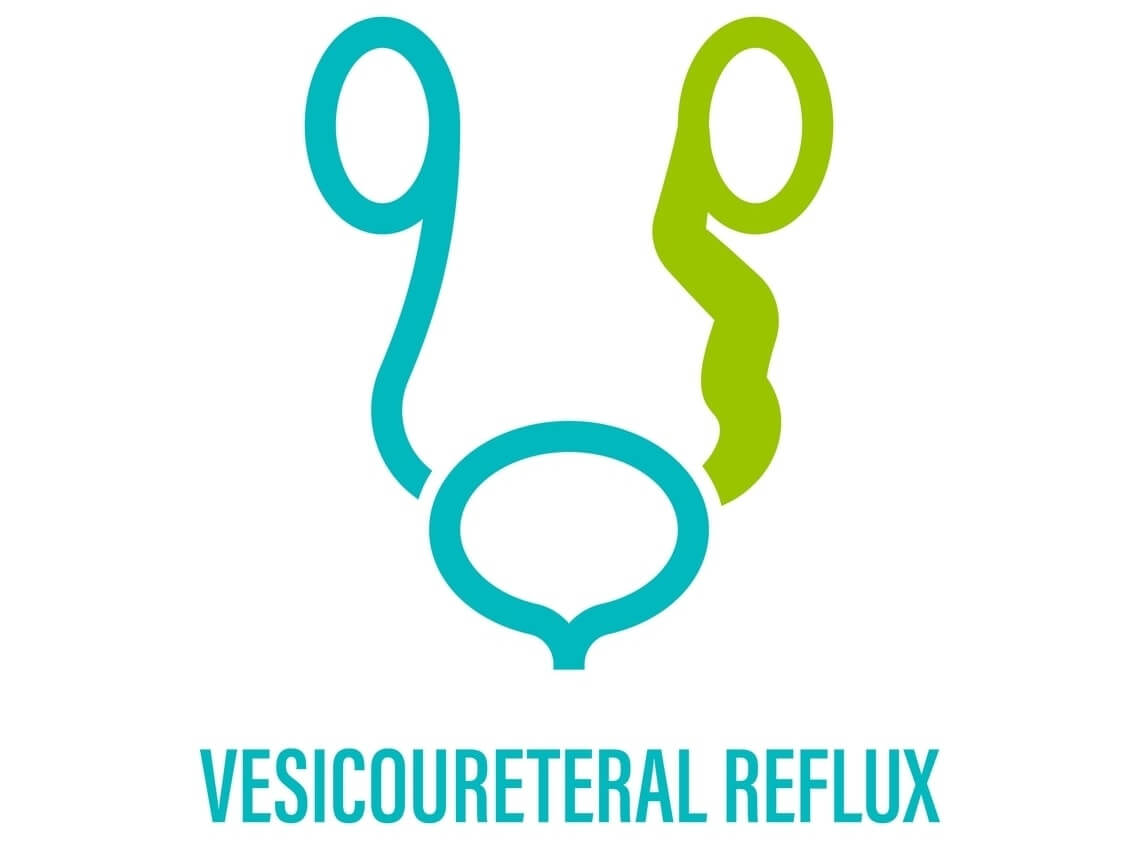
Because vesicoureteral reflux (VUR) usually does not cause symptoms by itself, parents often do not find out their child has this condition until after a related urinary tract infection (UTI) has developed. While it can be a little frightening to find out your child has a condition like VUR, it is often highly treatable and can sometimes resolve on its own in less severe cases.
To help you learn more about this condition, including the symptoms and complications to watch for as well as the most common treatment options, we’re happy to share the following overview.
What is vesicoureteral reflux (VUR)?
Vesicoureteral reflux describes the backing up of urine, or reflux, from the bladder into the kidneys, instead of out through the urethra. This is usually caused by dysfunction of the valve that ensures urine flows one way between the kidney to the bladder. Doctors grade the severity of VUR on a scale of one to five, with five being the most serious.
Although VUR is not normally painful by itself, it does cause an increased risk of UTI and kidney damage. It is important to recognize the signs of a UTI or other urinary dysfunction to avoid serious complications or long-term damage.
Pediatric Vesicoureteral Reflux Causes
VUR is most often related to abnormal valves in the bladder and is also associated with fluid in the kidneys, or hydronephrosis. There is believed to be a genetic component to this, but researchers have not yet identified a specific gene or genes. In less frequent cases, a neural tube defect such as spina bifida can cause bladder dysfunction resulting in VUR.
Pediatric Vesicoureteral Reflux Risk Factors
Only about 1-3% of children are affected by VUR, but it is present in approximately one third of all children diagnosed with a UTI, making UTI a significant risk factor for this condition. Other factors include:
- Age: VUR is more likely to be present in children under the age of two
- Gender: Doctors more frequently diagnose VUR in infant boys, while it is more likely to develop in older girls
- Any abnormality in the kidney or urinary tract increases the risk of VUR
- Having a parent or sibling with VUR
Pediatric Vesicoureteral Reflux Symptoms
Children with VUR very often do not feel direct symptoms or get sick right away. Due to the backwards flow of urine, bacteria can grow more easily in the urinary tract, leading to infection. VUR may also cause urinary dysfunction and accidents, as well as constipation. Symptoms to watch out for include:
- Fever
- Abdominal pain
- Frequent urge to urinate
- Painful urination
- Dark urine or blood in the urine
- Strong smelling urine
- Urinary incontinence
- Constipation
Pediatric Vesicoureteral Reflux Complications
The most significant complication of VUR is the potential for kidney infection and kidney damage. Although this is rare, the kidneys can become damaged if there is a high frequency of infection and/or they go untreated.
Diagnosing Pediatric Vesicoureteral Reflux
Along with steps like reviewing medical history, asking about symptoms, and performing a physical examination, doctors will generally order a number of specific tests to confirm that VUR is present, including:
- Contrast X-rays, including voiding cystourethrogram (VCUG) and radionuclide cystogram (RNC) that examine the urinary tract
- Renal ultrasound
- Blood tests
- Urinalysis and urine cultures
Pediatric Vesicoureteral Reflux Treatment
Based on the examination, the physician will give VUR a number score of severity from one to five. The less severe cases are more likely to improve on their own, with the primary goal of treatment being the prevention of frequent UTIs through low-dose antibiotics.
In more severe cases, surgery may be needed to reconstruct the connection between the bladder and the ureter. Another surgical option is an endoscopic procedure that can help keep the valve closed.
Caring for a Child With Pediatric Vesicoureteral Reflux
The long-term childcare needs associated with VUR can vary on a case-by-case basis. If surgery is required, there may be an increased level of care during the recovery and rehabilitation process. In other cases, taking steps to prevent UTIs including practicing good urinary and general hygiene can be beneficial.
Despite the challenges, families dealing with VUR are very often able to develop an effective treatment and care strategy for this condition. In some situations, care needs can be met effectively with the assistance of pediatric home health services.
Contact Care Options for Kids for Home Health Care in Florida
It can be hard to balance your time between work, home, and caring for a child. That’s why our team of skilled professionals at Care Options for Kids is here to help. We have been enforcing precautionary measures and following the Centers For Disease Control (CDC) guidelines for COVID-19 to ensure the safety and health of our clients and employees.
Our home health care services offer support in the comfort of your home. We refer loving and competent nurses to provide customized care for families — from a few hours a day to around-the-clock supervision. Contact us directly to speak with a home health care professional or request a free in-home assessment. Together we can determine the best plan of action to keep your loved ones happy and healthy.
If you or a loved one are considering Pediatric Home Health Care Services in Florida, contact the caring staff at Care Options for Kids. Call today at (888) 592-5855.
